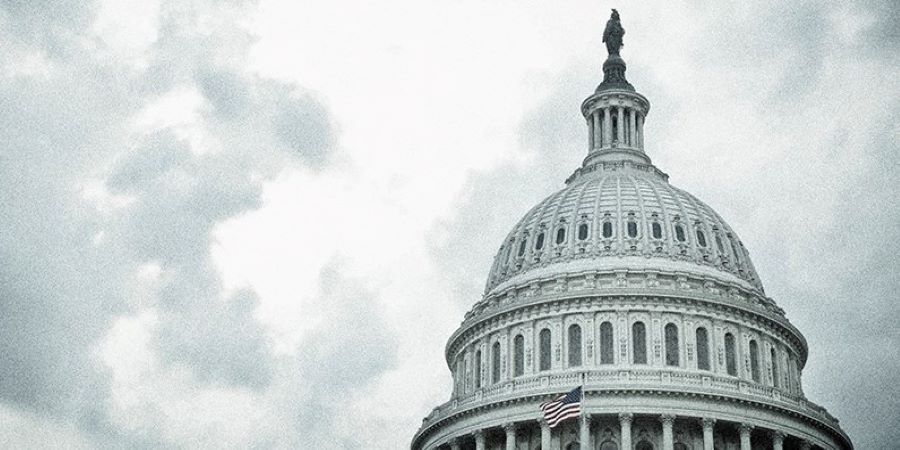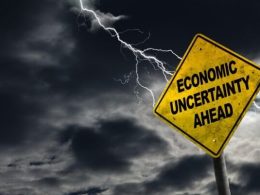by Greg Valliere, AGF Management Ltd.
WASHINGTON HAS OVER-DONE THE STIMULUS: The most important Fed meeting in years — and the gridlock on Capitol Hill over more spending — will send a clear signal that the pendulum is shifting on stimulus, which has over-heated the economy.
THE EASY CALL IS MONETARY POLICY, which will be reversed today. We expect Jerome Powell will announce that the Fed will end its asset purchases as early as March, with a clear a hint that the first of three rate hikes in 2022 could come by June. More rate increases are possible in 2023.
THE MORE DIFFICULT CALL is fiscal policy, as Democrats struggle to pass the last of Joe Biden’s huge stimulus packages — the Build Back Better bill, which has stalled. The measure hasn’t been fully written yet; there are major differences on state and local taxes, paid leave, and — most importantly — the enormous cost of the bill.
YESTERDAY’S RED-HOT PRODUCER PRICE REPORT may have been the final straw for Powell and Sen. Joe Manchin. Both see an inflation threat that may not subside until well into the second half of 2022. Powell will raise the funds rate; Manchin wants a pause in more fiscal stimulus.
MANCHIN HAS INFURIATED MOST DEMOCRATS, but in truth the party is badly divided on whether to move on BBB or fight instead for voting reform legislation. Both measures may drag into January or later, amid angry calls from the left to change filibuster rules, which were evaded as the debt ceiling was raised. But there aren’t enough Democrats to support a wholesale change to filibuster procedures.
A SKINNY VERSION OF BBB could still pass in early 2022, which would be the last hurrah for fiscal stimulus. The next big development may be a furious effort by Republicans to pare back spending after the 2022 election — as the GOP recaptures the House and perhaps the Senate as well.
AS THE ECONOMY ENTERS THE SECOND HALF OF 2022, it may be clear that the Fed will stick with monetary restraint, while fiscal policy faces a major haircut after the election. Will this be over-kill for an economy that’s likely to soften anyway? We’ve over-done it on the stimulus; could we next over-do it on the restraint?
THE GREAT WILD CARD, of course, is Covid and its variants — which are killing about 1,200 Americans every day. As usual, Europe is the canary in the coal mine, as battles rage between libertarians and vaccine proponents.
OMICRON COULD CHILL ECONOMIC GROWTH here and abroad, as everything from holiday travel to professional sports shut down. But the die will be cast this week in Washington — Powell and Manchin agree that more stimulus isn’t needed; their next battle, belatedly, is fighting inflation.
The views expressed in this blog are those of the author and do not necessarily represent the opinions of AGF, its subsidiaries or any of its affiliated companies, funds or investment strategies.
The views expressed in this blog are provided as a general source of information based on information available as of the date of publication and should not be considered as personal investment advice or an offer or solicitation to buy and/or sell securities. Speculation or stated believes about future events, such as market or economic conditions, company or security performance, or other projections represent the beliefs of the author and do not necessarily represent the view of AGF, its subsidiaries or any of its affiliated companies, funds or investment strategies. Every effort has been made to ensure accuracy in these commentaries at the time of publication; however, accuracy cannot be guaranteed. Market conditions may change and AGF accepts no responsibility for individual investment decisions arising from the use of or reliance on the information contained herein. Any financial projections are based on the opinions of the author and should not be considered as a forecast. The forward looking statements and opinions may be affected by changing economic circumstances and are subject to a number of uncertainties that may cause actual results to differ materially from those contemplated in the forward looking statements. The information contained in this commentary is designed to provide you with general information related to the political and economic environment in the United States. It is not intended to be comprehensive investment advice applicable to the circumstances of the individual.
AGF Investments is a group of wholly owned subsidiaries of AGF Management Limited, a Canadian reporting issuer. The subsidiaries included in AGF Investments are AGF Investments Inc. (AGFI), AGF Investments America Inc. (AGFA), AGF Investments LLC (AGFUS) and AGF International Advisors Company Limited (AGFIA). AGFA and AGFUS are registered advisors in the U.S. AGFI is a registered as a portfolio manager across Canadian securities commissions. AGFIA is regulated by the Central Bank of Ireland and registered with the Australian Securities & Investments Commission. The subsidiaries that form AGF Investments manage a variety of mandates comprised of equity, fixed income and balanced assets.
About AGF Management Limited
Founded in 1957, AGF Management Limited (AGF) is an independent and globally diverse asset management firm. AGF brings a disciplined approach to delivering excellence in investment management through its fundamental, quantitative, alternative and high-net-worth businesses focused on providing an exceptional client experience. AGF’s suite of investment solutions extends globally to a wide range of clients, from financial advisors and individual investors to institutional investors including pension plans, corporate plans, sovereign wealth funds and endowments and foundations.
For further information, please visit AGF.com.
©2021 AGF Management Limited. All rights reserved.
This post was first published at the AGF Perspectives Blog.















